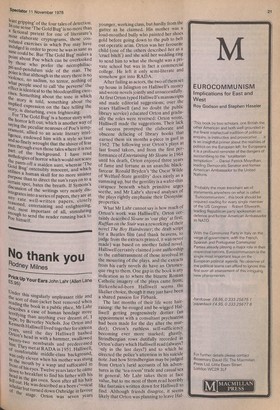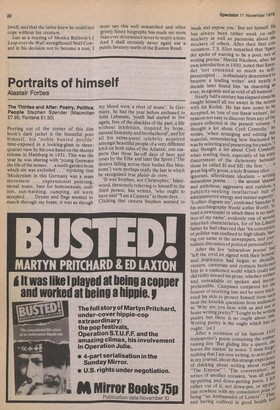No thank you
Rodney Milnes
Prkk Up Your Ears John Lahr (Allen Lane Under this singularly unpleasant title and the sort of dust-jacket best removed when reading the book in a public place,r Lahr describes a case M more ase of human bondage g than anything ever dreamt of, I ,r1°Pe, by Beverley Nichols. Joe Orton and Nenneth Halliwell lived together for sixteen cars, until the day Halliwell bashed 'ion's head in with a hammer, swallowed h.entY-two nembutals and predeceased „Ifni' They met at RADA in 1951. Hama, comfortable middle-class background, , as only eleven when his mother stung was was '.II i the mouth by a wasp and suffocated n r'Tont of his eyes. Twelve years later he came downto breakfast to find his father with his fneIe. i ad n the gas oven. Soon after all his hair _IHe was described as a born c'sical 'cofbolar but turned down Oxbridge in .. favour the stage. Orton was seven years younger, working class, but hardly from the gutter as he claimed. His mother was a loud-mouthed bully who painted her shoes gold before going down to the pub to belt out operatic arias. Orton was her favourite child (one of the others described her as a 'cruel bitch') and she sold her wedding ring to send him to what she thought was a private school but was in fact a commercial college. He left it only semi-literate and somehow got into RADA. After failing as actors, the two of them set up house in Islington on Halliwell's money and wrote novels jointly and unsuccessfully. At first Orton typed Halliwell's manuscripts and made editorial suggestions; over the years .Halliwell (and no doubt the public library service) educated Orton and gradually the roles were reversed: Orton wrote, Halliwell made the suggestions. Their lack of success prompted the elaborate and obscene defacing of library books that earned them six months a-piece in gaol in 1962. The following year Orton's plays at last found takers, and from the first performance of Entertaining Mr Sloane in 1964 until his death, Orton enjoyed three years of fame and fortune as an anarchic blackfarceur. Ronald Bryden's `the Oscar Wilde of Welfati-State gentility' does nicely as a summing up, but the gentility is a wafer-thin carapace beneath which primitive urges seethe, and Mr Lahr's shrewd analyses of the plays rightly emphasise their Dionysiac properties. What Mr Lahr cannot say is how much of Orton's work was Halliwell's. Orton certainly described Sloane as 'our play' at first; Ruffian on the Stair was a reworking of their novel The Boy Hairdresser; the draft script for a Beatles film (and thank heavens, to judge from the extracts printed, it was never made) was based on another failed novel. Halliwell certainly claimed joint authorship to the embarrassment of those involved in the mounting of the plays, and the extracts from his early novels do have an Ortonesque ring to them. One gap in the book is any indication as to where the bizarre Roman Catholic imagery of the plays came from; Birkenhead-born Halliwell seems the likelier choice, though it may just have been a shared passion for Firbank. The last months of their life were hairraising: the be-rouged and be-wigged Halliwell getting progressively dottier (an appointment with a consultant psychiatrist had been made for the day after the murder); Orton's ruthless self-sufficiency becoming ever more marked; ghastly, Strindbergian rows dutifully recorded in Orton's diary which Halliwell read (always? -Nnly in the last days?) and to which he directed the police's attention in hip suicide note. Just how Strindbergian may be judged from Orton's lurid accounts of his adventures in the 'tea-room' trade and casual sex in general; Mr Lahr takes them at face value, but to me most of them read horribly like fantasies written down for Halliwell to find. Although friends disagree, it seems likely that Orton was planning to leave Hal liwell, and that the latter knew he could not cope without his creature.
Just as a reading of Monica Baldwin's I Leap over the Wall strengthened Noel Coward in his decision not to become a nun, I must say this well researched and often grimly funny biography has made me more than ever determined never to marry a man. And I shall certainly never again use at public lavatory north of the Euston Road.



































 Previous page
Previous page